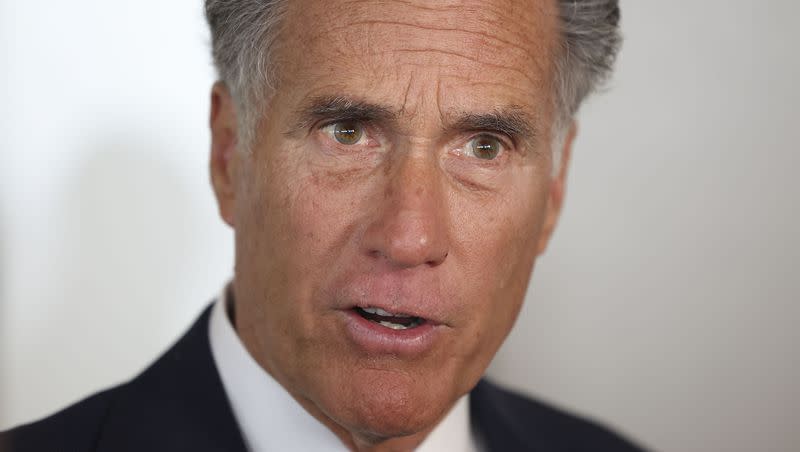Sen. Mitt Romney says GOP candidates should unite behind one Trump opponent by February

- Oops!Something went wrong.Please try again later.
- Oops!Something went wrong.Please try again later.
- Oops!Something went wrong.Please try again later.
Utah Sen. Mitt Romney is marking a date on the calendar — Feb. 26 — by which point, he says, all GOP candidates running for president in 2024 should clear the path for one person to go up against former President Donald Trump for the Republican nomination.
He asked Republican megadonors and influencers to take charge and “do something they didn’t do in 2016: get candidates they support to agree to withdraw if and when their paths to the nomination are effectively closed,” he wrote in an opinion piece published in The Wall Street Journal Monday.
Early primaries will already be decided in Iowa, New Hampshire, Nevada and South Carolina by Feb. 26.
But, as Romney, a Republican, said, no-hope candidates tend to stay in the race for many reasons.
He used Mike Huckabee and Rick Santorum as examples of 2016 presidential candidates who “got paying gigs” after their campaigns ended late in the race. Romney quoted former New Hampshire Gov. John H. Sununu, who said, “It is fun running for president if you know you cannot win.”
Of the hangers-on, “They will split the non-Trump vote, giving him the prize. A plurality is all that is needed for winner-take-all primaries,” Romney said.
Related
Romney argued that in the past, candidates would rally around one person for a common goal. He detailed the presidential election of 1968 involving his father, George W. Romney, then-governor of Michigan, who was one of the leading candidates in the race among Republicans.
The Utah senator said other hopefuls, including William Scranton, Charles H. Percy, Mark Hatfield, John Chafee and Nelson Rockefeller dropped out and united behind Romney “because they believed he had the best shot of stopping Richard Nixon.”
“They were unsuccessful but not because of blind political ambition or vanity. They put a common cause above personal incentives,” he said, adding that narrowing the field this way doesn’t happen anymore.
Romney asked donors, especially deep-pocketed billionaires with commitments to candidates that exceed tens of millions of dollars, to set clear goals alongside their donations.
“Donors who are backing someone with a slim chance of winning should seek a commitment from the candidate to drop out and endorse the person with the best chance of defeating Mr. Trump by Feb. 26,” he said.
Romney said although donors may expect party leaders to guide Republicans in the race, “candidates don’t listen to party officials, because voters don’t listen to them either.”
Related
He warned it is often a campaign’s employees — consultants and staff — who discourage a candidate from dropping out.
“They buck up candidates, promoting long-shot prospects and favorably biased internal polls. I can almost hear the words from ‘Dumb and Dumber’ — ‘So you’re telling me there’s a chance?’” Romney said.
He said the United States needs “a nominee with character, driven by something greater than revenge and ego, preferably from the next generation.”
“Family, friends and campaign donors are the only people who can get a lost-cause candidate to exit the race,” Romney said, adding that after the early primaries, they should start doing exactly that.
Apart from Trump, more than a dozen Republicans are in the running for the Republican nomination for 2024, including Florida Gov. Ron DeSantis, former South Carolina Gov. Nikki Haley, former Vice President Mike Pence, businessman Vivek Ramaswamy, as well as Romney’s colleague in the Senate, South Carolina Sen. Tim Scott, among others.
Republicans react to Romney’s op-ed
Romney’s suggestion to donors and Republican contenders that they should coalesce around one candidate against Trump, who is leading in Republican primary polls, earned a mixed reaction from political leaders in Utah and beyond.
Riverton Mayor Trent Staggs reacted to The Wall Street Journal op-ed on Twitter, saying he couldn’t remember the last time he saw Romney.
“He seems to serve one purpose in the Senate, and that is to spite Donald Trump,” Staggs said. “He has allowed his personal vendetta to cloud him to a point that he can no longer even represent his constituents.”
As a mayor in Utah, I can not tell you the last time I saw Mitt Romney. He seems to serve one purpose in the Senate, and that is to spite Donald Trump. He has allowed his personal vendetta to cloud him to a point that he can no longer even represent his constituents. https://t.co/rCAaTsnElE
— Mayor Trent Staggs (@MayorStaggs) July 24, 2023
Meanwhile, Utah state Sen. Nate Blouin, a Democrat representing the 13th District, said Romney is “showing more political courage than any other Utah Republican.”
Romney once again showing more political courage than any other Utah Republican. https://t.co/ifkuNwvvO0
— Nate Blouin (@NateForUtah) July 24, 2023
Brian Bartlett, who served as the war room director for Romney’s presidential campaign in 2012, also chimed in, calling Romney’s op-ed “a strong case,” but added that Feb. 26 will be too late.
“It needs to happen in December and January, if not sooner for some,” Bartlett said.
A strong case by my old boss @MittRomney for the GOP field to coalesce around a non-Trump candidate — but Feb 26 is too late; it needs to happen in December and January, if not sooner for some. https://t.co/eAjGTd3hTa
— Brian Bartlett (@BrianBartlett) July 24, 2023

